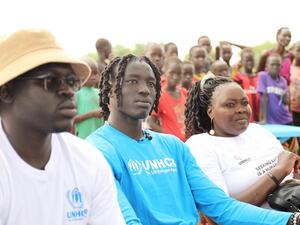UNHCR calls for calm and access to newly displaced people in Myanmar's Rakhine state
UNHCR calls for calm and access to newly displaced people in Myanmar's Rakhine state

Since inter-communal violence flared up again on October 21 in parts of Myanmar's Rakhine state, thousands of people have fled on boats towards the state capital Sittwe.
YANGON, Myanmar, October 30 (UNHCR) - The UN refugee agency on Tuesday expressed alarm at renewed violence in western Myanmar's Rakhine state over the past week, which the government says has displaced more than 28,000 people. "It is clearly urgent that law and order be restored to prevent further violence, and that access is facilitated so that aid can be provided to those in need," UNHCR spokesman Adrian Edwards told journalists in Geneva.
Since a new wave of inter-communal unrest began on October 21, the Rakhine state authorities estimate that dozens of people have been killed and more than 4,600 homes burnt in the townships of Minbya, Myebon, Mrauk-U, Pauk Taw, Rathedaung, Kyauk Phyu, Ramree and Kyauk Taw.
Last weekend, UNHCR joined an inter-agency visit to some of the affected areas. "We saw widespread destruction and displacement. Our staff noted that many of the internally displaced people are in extremely hard-to-reach areas," Edwards said.
More than 3,000 people have fled in boats towards the state capital, Sittwe, to seek assistance in existing camps for internally displaced people (IDP). The camps in and around Sittwe are already hosting most of the 75,000 people who remain displaced from the wave of violence that broke out in Rakhine state in June this year.
With the new influx, these already overcrowded camps are being stretched beyond capacity in terms of space, shelter and basic supplies such as food and water. Food prices in the area have doubled and there are not enough doctors to treat the sick and wounded.
Many displaced people have also found shelter with communities near and in the IDP camps at Sittwe, while unknown numbers have fled into the hills in locations such as Pauk Taw and Myebon. It is estimated that another 6,000 people are stranded on boats or on islets along Myanmar's western coast. They are looking for safe access to places where they can receive assistance.
Some affected people remain in their villages, living in poor conditions and waiting in hope that they can rebuild their homes. There are reports that people are receiving threats that their homes will be burnt, prompting some to flee in fear.
Edwards in Geneva said that, as part of the overall UN response and as an immediate measure to address the urgent humanitarian needs, UNHCR was sending tarpaulin supplies to provide shelter for 2,000 people in the villages of Minbya township.
More plastic sheets, blankets and mosquito nets are on their way to Sittwe. This is in addition to relief supplies and basic aid items for around 54,000 people in IDP sites which our teams have distributed over the past few months.
UNHCR is, meanwhile, appealing to neighbouring countries to keep their borders open for those people seeking safety from the unrest in Rakhine state. "We stand ready to assist governments in addressing this evolving humanitarian emergency," Edwards stressed.
By Anna Little in Yangon, Myanmar








